Are you a proud owner of a tiny, adorable newborn kitten? Congratulations. As a new owner, it’s crucial to keep a watchful eye on your furry little friend and make sure they’re healthy and happy. But what if you notice your precious kitten panting? Don’t panic just yet, but be aware that panting in newborn kittens can indicate underlying health issues.
Panting is normal for adult cats, but not so much for baby kittens. When a kitten pants, it could be due to overheating or an insufficient supply of oxygen to their delicate bodies. These situations can be life-threatening, especially for young kittens with underdeveloped immune systems.
There are several reasons why your kitten may be panting, including developmental defects, illness, or environmental factors. Some issues are easy to treat while others require immediate veterinary attention. As a responsible owner, it’s essential to understand the reasons behind your kitten’s panting and take appropriate measures to ensure their well-being.
In this informative blog post, we’ll explore the various reasons why your newborn kitten may be panting and provide tips on how you can help them. So let’s dive into this concerning behavior in kittens together.
Causes of Panting in Newborn Kittens
Newborn kittens are precious little creatures that need an abundance of love and care. As a pet owner, it is essential to keep a close eye on your kitten’s behavior and seek veterinary care immediately if you notice any signs of distress or illness. One behavior that may cause alarm is panting in newborn kittens.
Panting in newborn kittens is not a common occurrence, and when it happens, it could indicate an underlying health issue. It is crucial to identify the cause of panting promptly to provide the necessary care and treatment. Several factors can lead to panting in newborn kittens, some of which include:
Heart Disease
Heart disease is another potential cause of panting in newborn kittens. Kittens with heart disease may experience panting, coughing, lethargy, and weight loss. If you notice any of these symptoms, seek veterinary care immediately.
Newborn kittens are also susceptible to hypothermia, which occurs when their body temperature drops below normal levels. Signs of hypothermia include panting, shivering, and lethargy.
Infections can also cause panting in newborn kittens. Kittens can contract infections from their mothers or the environment. Respiratory infections can cause panting, coughing, sneezing, and nasal discharge.
Respiratory Distress
Panting is not normal for kittens and can indicate an underlying health issue. One of the most common causes of panting in newborn kittens is respiratory distress, which can be triggered by various factors.
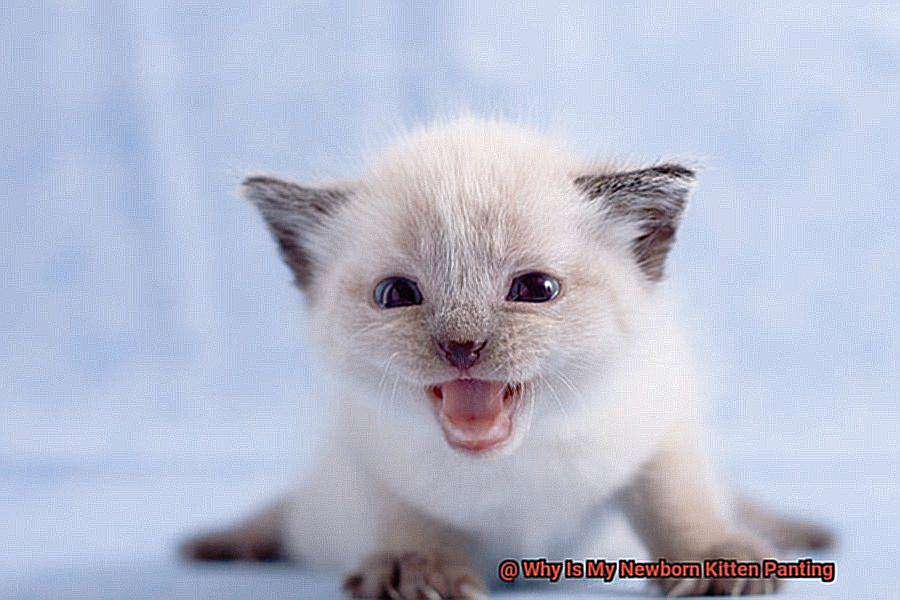
Infections are a leading cause of respiratory distress in kittens. Feline herpesvirus and calicivirus are respiratory viruses and bacteria that can inflame the respiratory tract, leading to panting and breathing difficulties.
Allergies can also trigger respiratory distress in kittens. Common allergens like dust, pollen, and cigarette smoke can irritate their airways, causing inflammation and making it harder for them to breathe. If your kitten is exposed to any allergen, they may pant excessively and show other signs of respiratory distress.
Furthermore, some kittens may be born with congenital defects affecting their respiratory system. For example, a cleft palate or other deformity can make it challenging for them to breathe properly, leading to excessive panting.
If you notice your newborn kitten panting or showing signs of respiratory distress, seek veterinary care immediately. Your veterinarian can diagnose the underlying cause and recommend appropriate treatment options to help your kitten breathe more comfortably.
Overheating
Overheating is one of the most common issues that can arise with your furry friend, causing them to pant excessively. In this post, we will dive deeper into how overheating can affect your kitten and what steps you can take to prevent it.
Newborn kittens are unable to regulate their body temperature on their own, which means they need a warm and comfortable environment to thrive. However, if the room temperature is too high or your kitten is exposed to direct sunlight, they may become overheated. This can be a serious issue as it can lead to more severe health problems if not addressed promptly.
When your kitten overheats, their body will try to cool itself down by panting. Panting allows the kitten to release excess heat through their mouth and nose, which helps regulate their body temperature. However, if the room temperature remains too high, your kitten may not be able to cool down effectively.
To prevent overheating in your newborn kitten, it is crucial to monitor the room temperature and ensure that it does not exceed 80°F. If the room temperature is too high, you can use fans or air conditioning units to lower it. Additionally, avoid exposing your furry friend to direct sunlight or placing them in an enclosed space without proper ventilation.
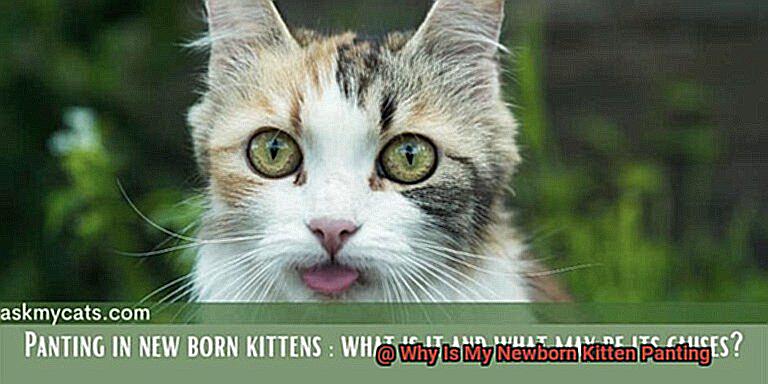
If you notice signs of overheating in your kitten, such as excessive panting or lethargy, act quickly. Move your furry friend to a cooler area immediately and provide them with a cool, damp towel or place them on a cool surface like tile or linoleum. It is crucial not to immerse the kitten in water as this can lead to shock or hypothermia.
In conclusion, overheating is a serious issue for newborn kittens, but by monitoring the room temperature and providing a cool environment for your furry friend, you can prevent this from happening. Remember, your kitten’s health and comfort depend on your actions, so be vigilant and attentive to their needs.
Stress
It’s essential to know that stress can have a significant impact on your furry friend’s health and well-being. As an expert in kitten care, I’m here to shed some light on this often overlooked topic.
Kittens are incredibly sensitive creatures, and even minor changes can cause them to become stressed. Moving to a new home, exposure to unfamiliar animals or people, loud noises, and changes in routine or diet are all potential stressors for your furry friend.
When a kitten experiences stress, their body releases adrenaline and other stress hormones. These hormones cause rapid breathing and panting, with an increased heart rate adding to the problem.
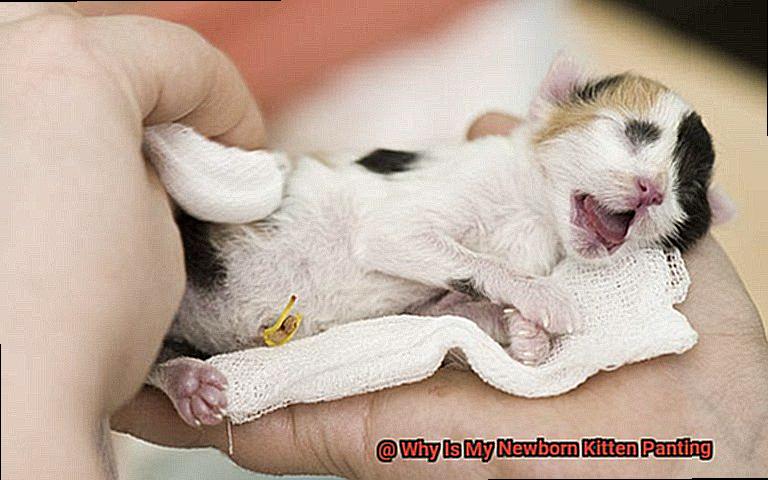
As a responsible kitten owner, it’s essential to minimize stress as much as possible. Providing a quiet and comfortable living space, avoiding sudden changes in routine, and slowly introducing new people or animals into the kitten’s environment are all great ways to keep their stress levels under control.
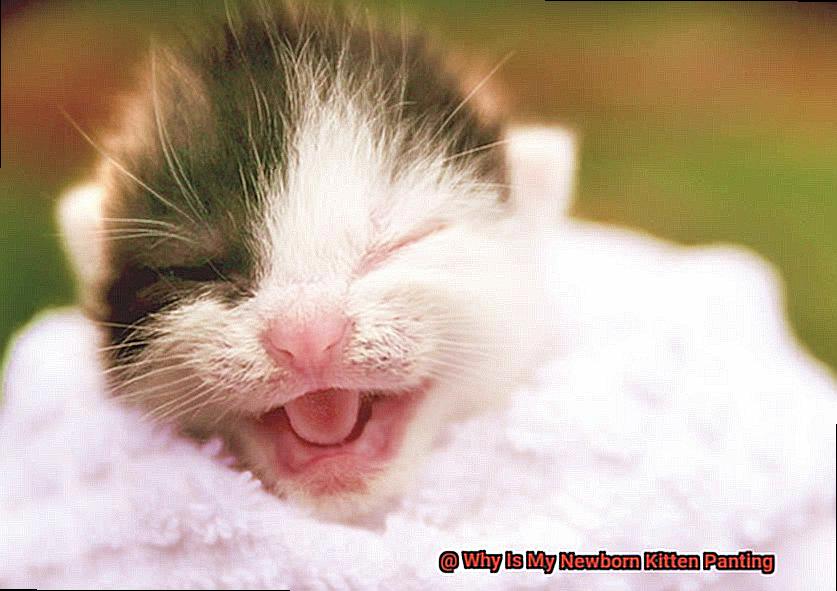
If you notice excessive panting in your kitten due to stress, remove them from the stressful situation immediately. Provide a calm and comforting environment and consider consulting with a veterinarian to rule out any underlying medical issues contributing to the panting.
Managing your kitten’s stress levels is crucial for their overall health and happiness.
Signs of Respiratory Distress in Newborn Kittens
But when it comes to respiratory distress, it can quickly become a matter of life and death. That’s why it’s crucial to know the signs of respiratory distress in newborn kittens and act quickly if you notice any.
Signs of respiratory distress can include rapid breathing, wheezing, coughing, or even open-mouthed breathing. In some cases, your kitten may also appear lethargic or weak and have difficulty nursing or eating. If you notice any of these signs, don’t delay – seek veterinary care immediately.
Your veterinarian will perform a physical examination and run tests to determine the underlying cause of the respiratory distress. In many cases, infections such as pneumonia or upper respiratory infections are the culprits. But with prompt treatment, including antibiotics or other medications prescribed by the vet, your kitten can recover quickly.
Preventing respiratory distress in newborn kittens is essential for their health and happiness. Keeping their environment clean and free from dust and other irritants can help prevent respiratory infections. And making sure they stay warm and dry can also help reduce the risk of respiratory distress.
As a cat owner, you want your kitten to grow up healthy and happy. By paying attention to their behavior and seeking veterinary care when needed, you can help reduce the risk of respiratory infections and ensure that your furry friend thrives.
Signs of Overheating in Newborn Kittens
Overheating can be a serious issue that can lead to a range of complications. To prevent any further issues, it’s crucial to know the signs of overheating in newborn kittens.
One of the most common indications of heat stress in newborn kittens is panting. If you notice your kitten panting excessively or breathing heavily, it may be an indication that they are too hot.
Other symptoms of overheating in newborn kittens include lethargy, dehydration, and loss of appetite. If your kitten seems to be sleeping more than usual or not showing interest in food or water, it could be a sign that they are experiencing heat stress.
Additionally, their gums and tongue may appear dry or pale, which is another sign of dehydration.
Fortunately, there are several steps you can take to prevent overheating in your little furball. It all starts by creating a cool and comfortable environment for your kitten. Ensure that their living space is well-ventilated and provide them with access to fresh water at all times. You might also consider using a fan or air conditioning unit to help regulate the temperature.
However, always keep an eye on your kitten’s behavior and act quickly if you suspect heat stress. Move them to a cooler area and give them fresh water immediately. You can also try dampening a towel and placing it on their body to help bring down their body temperature. If their symptoms persist or worsen, seek veterinary care as soon as possible.
Signs of Stress in Newborn Kittens
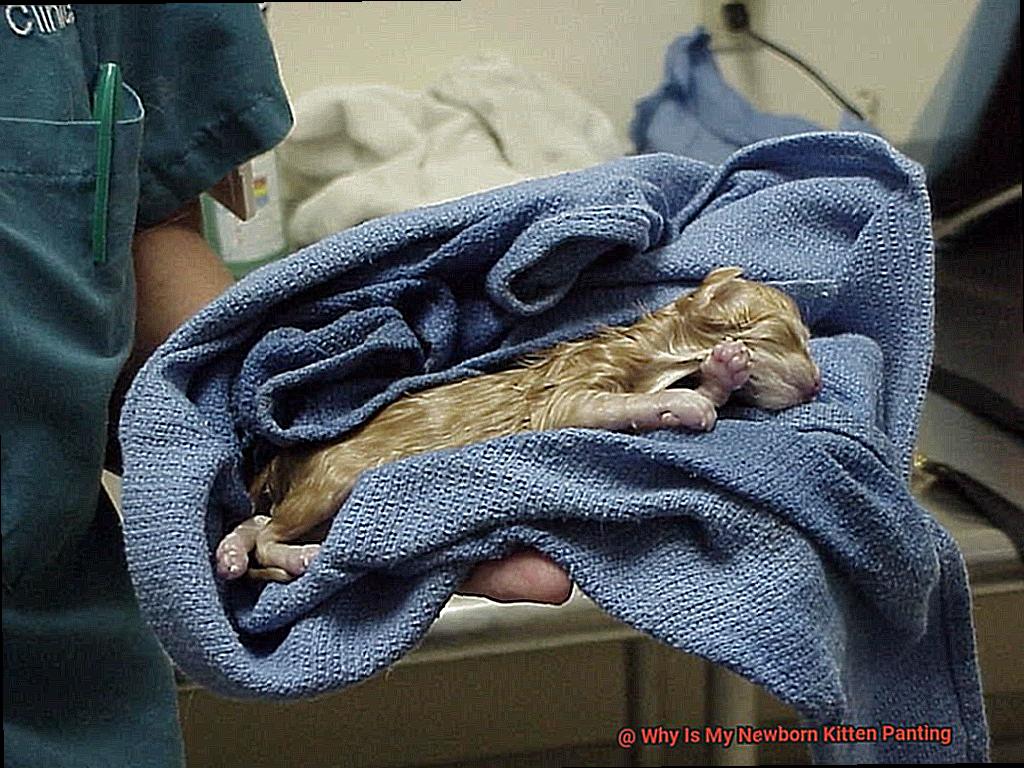
Although panting is one symptom, kittens can exhibit other worrisome behaviors, including restlessness, excessive crying or meowing, loss of appetite, and difficulty sleeping. If left untreated, stress in newborn kittens can lead to serious health consequences such as weakened immune systems and increased susceptibility to illness, and even death in some cases. Therefore, it’s crucial to address any signs of stress as soon as possible.

Common causes of stress in newborn kittens include changes in their environment, separation from their mother or littermates, and illness or injury. To prevent stress, provide your kitten with a comfortable and safe space that includes access to food and water, a comfortable temperature, and minimal exposure to loud noises or bright lights.
If you notice any signs of stress in your newborn kitten, don’t delay seeking veterinary care. Your veterinarian can help identify the underlying cause of the stress and develop a treatment plan to address it. This may involve medications or supplements to calm the kitten’s nervous system or providing supportive care such as fluids or oxygen therapy.
Aside from seeking veterinary care, there are steps you can take at home to help alleviate your kitten’s stress. Providing a calm and quiet environment, spending time with the kitten to provide comfort and reassurance, and offering gentle massages or other soothing techniques can all help reduce stress levels.
Remember that most newborn kittens can overcome stress with proper care and attention. Keep an eye out for any signs of stress in your kitten and seek veterinary care if necessary.
When to Seek Veterinary Care for Panting in Newborn Kittens
While panting in kittens can sometimes be a sign of stress, it can also indicate serious underlying health issues that require immediate attention from a veterinarian.
If you observe that your newborn kitten is excessively panting, has rapid breathing, or is struggling to breathe, it’s crucial to seek veterinary care immediately. These symptoms can indicate respiratory distress or heart problems that can be life-threatening if left untreated. Additionally, keep an eye out for other signs such as blue gums, wheezing, lethargy, and loss of appetite.
It’s important to note that kittens are more susceptible to heatstroke and dehydration than adult cats due to their small bodies. If you notice your kitten is panting due to overheating or dehydration, seek veterinary care promptly. Quick medical intervention can prevent severe complications and save your kitten’s life.
If you notice any signs of respiratory distress or overheating in your newborn kitten, don’t hesitate to seek veterinary care. Your veterinarian can diagnose the underlying issue and provide prompt treatment that can make all the difference in your kitten’s health and well-being. Remember to provide a comfortable and safe environment for your kitten to prevent stress and monitor their behavior closely for any concerning symptoms.
Prevention Tips for Panting in Newborn Kittens
Bringing a newborn kitten into your home is an exciting experience, but it also comes with a lot of responsibility. One of the crucial aspects of caring for your little furball is taking preventive measures to avoid panting in newborn kittens. Panting can be a sign of serious health issues, but you can ensure that your kitten stays healthy and happy by following these five tips.
Keep the Environment Comfortable
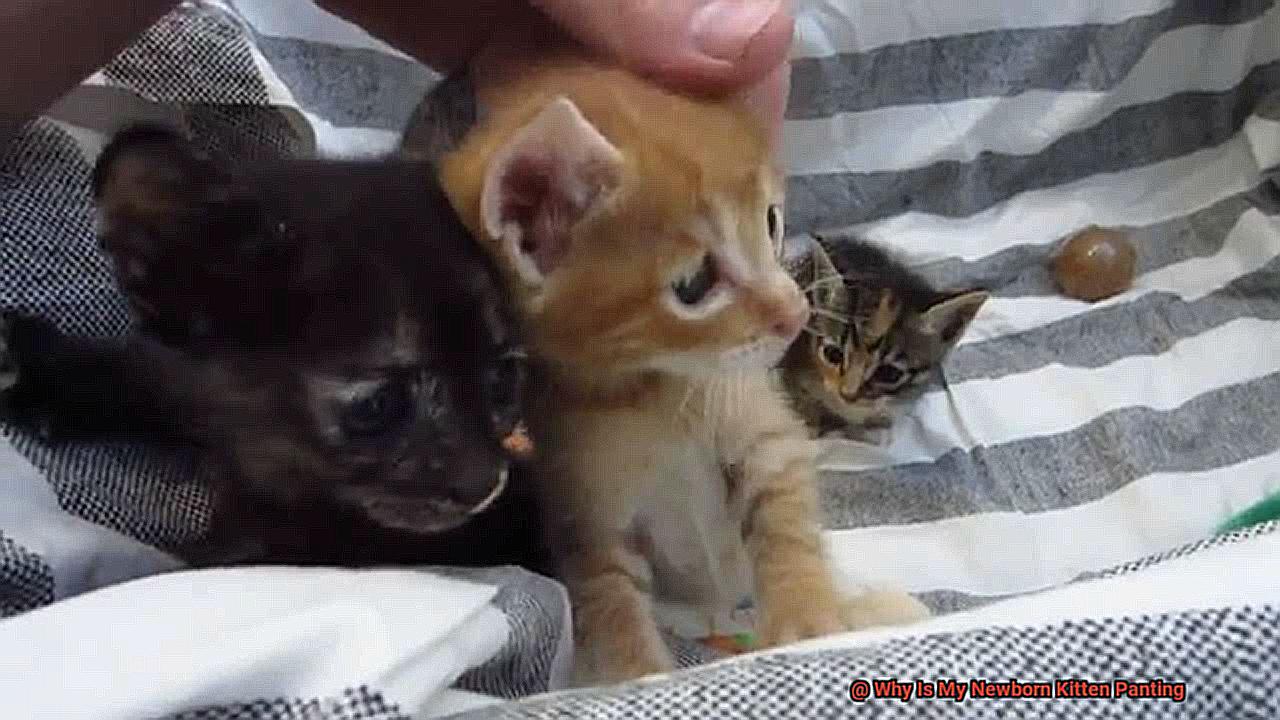
Newborn kittens are sensitive to changes in temperature and humidity, so it’s essential to keep their living space warm and cozy. A temperature of around 75-80°F (24-27°C) with a relative humidity of around 55% is ideal for the first few weeks of life. You can achieve this by using a heating pad or a heat lamp. Avoid placing your kitten in drafty areas or direct sunlight, which can cause dehydration and panting.
Monitor their Feeding
Newborn kittens require frequent feedings to maintain their body temperature and energy levels. It’s vital to ensure that they are getting enough milk from their mother or kitten formula if they are orphaned. Overfeeding can lead to bloating and diarrhea, which can cause panting. If you notice any changes in your kitten’s feeding routine, consult with your veterinarian immediately.
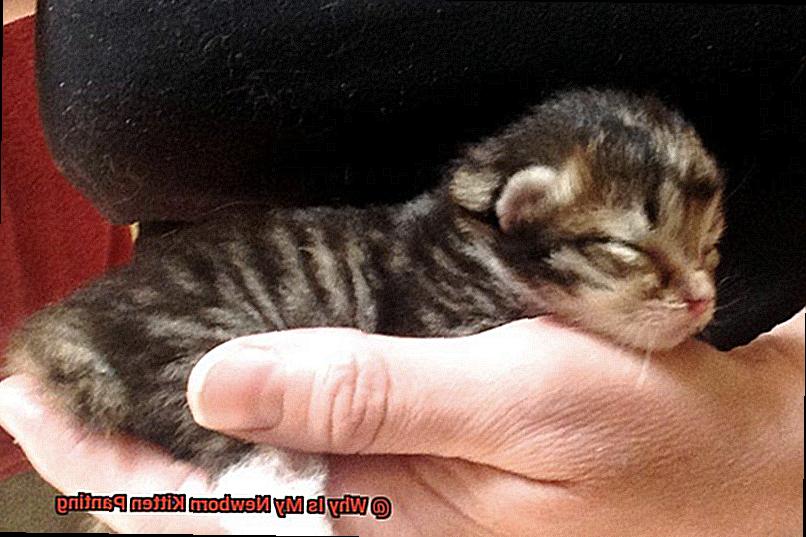
Keep Them Hydrated
Dehydration can cause panting, so it’s important to monitor your kitten’s water intake. Ensure that they have access to clean water at all times, and you can also add a small amount of water to their food to keep them hydrated.
Monitor their Breathing
Pay attention to your kitten’s breathing patterns, as any irregularities such as rapid or shallow breathing may be a sign of underlying health issues. If you notice anything unusual or concerning, consult with your veterinarian immediately.
Regular Vet Checkups
Regular checkups with a veterinarian can help prevent any potential health issues that may cause panting in newborn kittens. It’s essential to keep up with your kitten’s vaccination schedule and discuss any concerns or questions you may have with your vet.
In addition to these tips, providing your kitten with lots of love, attention, and socialization can also help reduce stress levels that could cause panting. Spend time playing with your kitten and ensure that they have a comfortable and safe space to rest and relax.
Panting in newborn kittens can be a sign of serious health issues, but you can take preventive measures to ensure that your little furball stays healthy and happy. By following these tips, you can provide your kitten with the best possible care and help them grow up healthy and strong.
ML6fJP9HQ4U” >
Conclusion
When it comes to your newborn kitten’s health, vigilance is key. Panting in newborn kittens can be a sign of underlying health issues, so it’s essential to identify the cause promptly and provide necessary care and treatment. There are several reasons why your kitten may be panting, including developmental defects, illness, or environmental factors.
Common causes of panting in newborn kittens include respiratory distress syndrome (RDS), heart disease, hypothermia, infections, exposure to toxins or chemicals, overheating, and stress. If you notice any signs of respiratory distress or overheating in your kitten, seek veterinary care immediately. Your veterinarian can diagnose the underlying issue and provide prompt treatment that can make all the difference in your kitten’s health and well-being.
Preventive measures such as keeping the environment comfortable, monitoring their feeding and hydration, regular vet checkups, and providing lots of love and attention can help reduce stress levels that could cause panting. As a responsible pet owner, it’s crucial to understand the reasons behind your kitten’s panting behavior and take appropriate measures to ensure their well-being.
So remember: watch your kitten’s behavior closely and provide them with the necessary love and attention they require to thrive.







